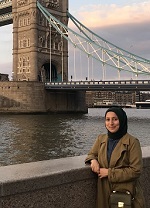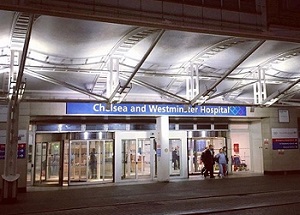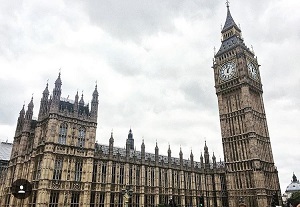by Enise Beyzanur Ceran.

Enise Beyzanur Ceran,
Medical University of Vienna, Austria
First of all, let me start with a quote by Virginia Woolf: “To walk alone in London is the greatest rest”.
In order to experience working in London and to get to know the British health care system, I decided to do a one-month elective in the Accident & Emergency sector during my fourth year.
To start our fifth year, we as students of the Medical University of Vienna have to complete twelve weeks of electives. Four weeks of them have to be in internal medicine, four weeks are by choice and the other four weeks are compulsory in primary care. I had decided to do my primary care elective at the Imperial College London. Great Britain is known to have a very good education system and studying medicine in this country is competitive as well. Therefore, I thought that experiencing the education in London would be great and so I started researching about how to organize my elective in the United Kingdom.
The Application Process
To start with, be aware that you have to deal with a lot of paper work in order to get accepted. British Universities are very strict about requirements for applications. There are many students from different countries who wish to do an elective during summer, which is why the placements are on a first come first serve basis. Consider that one should apply one to two years prior to the desired elective date.
My contact was Mr. Matthew Shotliff who is the Interim Undergraduate Teaching Coordinator. One starts by sending him an E-Mail with an elective request. If there is any possibility in your desired timeframe he will send you an email with an application form, which you have to send to him with other required documents as listed below:
- Occasional electives application form
- Passport
- Letter from your university – must include what year of university you are in and must be from dean or your elective coordinator
- Occupational health questionnaire (both pages) – must include copies of all vaccines
- A letter from the university, confirming that you are a student of the MBBS course (final year student) or at penultimate year of this course and that you are approved to do the elective, which will contribute to their degree studies. MUST contain the institution’s official stamp and contact details (email and postal address)
- An academic reference/testimony/report from a member of staff at your home university/college who is familiar with their academic studies. Such references MUST bear the institution’s official stamp and contact details (email and postal address) and the status of the person providing the reference as well.
- Curriculum vitae (CV) including date of birth, email and postal address.

© Enise Beyzanur Ceran – The Queen Victoria Memorial, that you can see in this picture is located at the front of Buckingham Palace and commemorates the death of Queen Victoria in 190.
Furthermore, teaching lessons will be in English, so all applicants should have a good competency in spoken and written English. The accepted tests are IELTS (Academic) and TOEFL. Consider that the IELTS test result is only valid for two years. Universities often demand an IELTS score of 6 or 7. They may also demand a minimum score in each of the 4 sections.
Moreover, the elective placement can be up to six weeks, but no longer than that and one has to pay 200 Pounds to Chelsea & Westminster NHS Trust. As for the insurance, you are required to show them that you are insured. I sent them my insurance certificate which I received from my university and this was accepted. You will easily get yours by writing a request to studierendenversicherung@oeh.ac.at.
Once you have done all the points above and you have sent your application, the Imperial College London will take about six weeks for processing the forms. After receiving your acceptance confirmation, you can start booking your flight to London. If you ask yourself where to live, as living can be quite expensive there, note that the university helps you with an accommodation, which costs about 140 Pounds a week (in the area of Chelsea and Westminster, the area is like living in the first district in Vienna). Just ask in your application request if there is a possibility to accommodate there.
Arriving at Chelsea and Westminster Hospital
The Chelsea and Westminster Hospital is located in Chelsea – Westminster, one can easily access it with the Piccadilly line in South Kensington and the bus line 44 brings you directly to the hospital. This area is known to be one of the richer areas, so you’ll see beautiful houses on your way. Moreover, there are a lot of museums, such as the National History Museum, the Victoria and Albert Museum and the Science Museum, so if you have free time and energy you can explore London very easily after work.
Once you arrive at the hospital Mr. Shotliff helps you to find your department (in my case the Accident & Emergency department) and he gives you all the instructions for your start. All you need on your first day is a £20 deposit for the hospital ID card. Note that your home university card has to accompany your hospital ID Card. Regarding dress code, students and also most of the doctors in the UK are not required to wear a white coat, but they must be dressed smart and appropriate. Women mostly wear a skirt with a blouse and men wear trousers with a suitable shirt. Jeans are absolutely not allowed, as this is considered unprofessional. Also consider that you should wear open-topped shoes. When you are in the clinical areas you will be required to be bare below the elbows for infection control reasons.

© Enise Beyzanur Ceran – Here is a glimpse of the main entrance of the Chelsea and Westminster Hospital
I actually applied for the month of July, however due to other reasons I rescheduled my elective for September. Students are only permitted to observe doctors in their daily activities in the hospital, which means that you can not write any referrals, examine patients, withdraw blood etc. I was aware of that British tradition for medical students and did not expect to do much interventional stuff at all. However, during my elective I realized very soon, that I had been lucky, because final year medical students of the Imperial College London were doing their elective with me. This was a great opportunity because they had teachings almost every day and I was allowed to attend them.
Emergency departments in London have a specific focus on different areas in emergency medicine. Our hospital was a center for environmental alert situations. In case of a chemical attack, patients would have been treated by our hospital first. Therefore, doctors were once trained how to respond to incidents involving chemical and biological warfare agents and patients who had been in contact with the latter. We as medical students were seen as a part of the team and the training doctors assigned us specific roles as well. Experiencing this was amazing! It is important to mention that patients with STEMI for example were transferred to the Royal Brompton Hospital, because their special focus was on coronary events and our hospital didn’t have a Cathlab.
As I have mentioned before, I was seen as a part of the team from my first day until the end and everyone tried to help me when I had a question or concern. Foreign medical students are working with a consultant doctor who also serves as their mentor. He/She is the contact person if you have any specific wishes, such as shadowing in other departments or if you have to excuse yourself in case of an illness etc.
My Working Days
My usual day in the A&E (Accident & Emergency) started at 8am and mostly finished at 4pm. At 4pm the morning team hands over the patients to the afternoon team. Nightshift starts at 10pm. On my first day I sat down with my mentor and he told me about general rules and my working hours. He assured me that I was there to make the most out of my stay and that I should feel free to ask any questions. After that he introduced me to the emergency team, which consisted of registrars, foundation year doctors, nurses and students as well. Contrary to my expectations one of the doctors told me right away that there were two patients that needed to be seen and I was allowed to choose which one I would like to see, because it was my first day. To be honest I was overwhelmed since I did not expect to work by myself at all, especially not from my first day on. Long story short: I had chosen a patient with chest pain because this shouldn’t be too difficult. As medical students we had to take a thorough patient history and examine the patients before handing them over to the doctor, who assigned himself/herself to the patient while we were inside. Once finished, this took us about 15 to 20 minutes and we had to handover everything we knew about the patient to the doctor.

© Enise Beyzanur Ceran -The Big Ben is a clock at the north end of the Palace of Westminster in London.
Then the interesting part started: We were asked about further assessments and a plan with a proper list of differentials and how to proceed in order to find the diagnosis. I was not expecting any of this, so I had been a little startled at the beginning. However, I got better with every patient and realized very soon that this was the perfect approach of teaching. After presenting your case you see the patient together with the doctor as well, which is a good opportunity to find errors you made or to ask questions that you had forgotten to ask first. Patients with problems that included other areas such as gynecology or neurology were consulted to the specific team. Once those doctors arrived in the ED you had to tell them about the patient and after that the patients were mostly handed over to that team. All in all, I was lucky to see many aspects of internal medicine and trying to rule out differential diagnoses while I was with the patient – this was the best way of learning.
Nurses were very grateful, when you offered them help with the IV access and blood withdrawal. British students usually don’t do the blood withdrawal, so this is a great opportunity to shine and show them great Viennese skills.
Furthermore, the emergency departments for adult and pediatric patients are separated. Adult A&E also has a UCC (Urgent Care Center), which is run by teams of GPs (General Practitioners), specialist nurses and emergency doctors who provide prompt assessment, treatment and advice for patients who are less seriously ill, but still require urgent treatment.
You should also be aware that some patients might be difficult to understand as they have a different British accent. However, communication in general was definitely not problematic. If you did good on IELTS or TOEFL, you shouldn’t have difficulties at all.
Costs of my Elective
This is wat you can expect to spend in London within four weeks:
| Flight (return flight): | Ca. 460 € |
| Accomodation (per person): | Ca. 560 € |
| Food and drink: | Ca. 400 € |
| Transport: | Ca. 160 € (a monthly pass costs 140 Pounds) |
| Fees for 2 weeks elective: | Ca. 120 € |
| Activities (museums, sightseeing,etc.) | Ca. 300 € |
| Total: | Ca. 2000 € |
The British Health Care and Medical School

© Enise Beyzanur Ceran – This is the National History Museum, located in South Kensington, it is a must see! A giant dinosaur will welcome you in the entrance
Lastly let me tell you about the British health care and medical school, as this might be good to know before arriving in London.
Health care in the United Kingdom is a devolved matter, with England, Northern Ireland, Scotland and Wales each having their own systems of publicly funded healthcare. Most healthcare in England is provided by the National Health Service (NHS), which was launched in 1948. With the exception of some charges, the NHS in England remains free at the point of use for all UK residents. The funding for the NHS comes directly from taxation. Each NHS system uses General Practitioners (GPs) to provide primary healthcare and to make referrals to further services as necessary. Hospitals then provide more specialized services, including care for patients with psychiatric illnesses, as well as direct access to Accident and Emergency (A&E) departments. Community pharmacies are privately owned but have contracts with the relevant health service to supply prescription drugs. In England and Wales, the National Institute for Health and Clinical Excellence (NICE) sets guidelines for medical practitioners how various conditions should be treated and whether or not a particular treatment should be funded. So, while working with the doctors you can be prepared that some of them might ask you if you checked the NICE guidelines while preparing further assessments and planning treatments of your patient.
About Medical School
Let me also give you an overview about the postgraduate training. Medical school in the UK generally lasts five or six years: two years of them are pre-clinical training in an academic environment followed by three years clinical training at a teaching hospital and in community settings. Undergraduate training in the UK mainly consists of two different teaching methods, which is set up of either problem-based learning (PBL), in which students in small groups of 8-10 clarify an academic, clinical or ethical scenario. The other method is the lecture-based learning, in which information is mainly delivered through large lectures or seminars.
In their final year, students begin applying for their postgraduate training. The system after med school is called the UK Foundation Program, and is basically an online application process, without interviews, based on a matching scheme. Each student ranks his/her preferred Foundation Schools, in two or three different cities. They are then ranked based on the answers given on their application form and their marks gained in examinations during their undergraduate career. After being selected to their hospital, applicants are chosen into specific jobs, in which they mostly have to do an interview and submit their CV.
So once accepted, medical students now being doctors enter their first year as as a Foundation House Officer (FHO). This equals the KPJ in Austria and foundation year 1 doctors must rotate in internal medicine, surgery and an elective area of focus. In foundation year 2 the training is followed by doing a rotation in general medicine or other specialties, such as general practice, emergency medicine, pediatrics, psychiatry, obstetrics or pathology. Once having completed the foundation program, the next stage of the training starts, which is called “specialty training”. The doctors are now called Specialty Registrars (StR). The duration of StR training varies by specialty and lasts between six and eight years in a hospital. After that, they become consultant doctors and can extend their career by obtaining an academic clinical fellowship for research.
All in all, my aim to get to know the British health system and profit from the training that is given to medical students started with a long process of compulsory paperwork which seems to never end. However, once done and accepted for the elective, one can be lucky and look forward to a great time in London. One will learning medicine by doing, gain self-confidence and furthermore, be able to live in an amazing historical city.
Enise Beyzanur Ceran
About me: I am a medical student born in Vienna and originally from Turkey. I started medical school in 2012 and attended the Going International – Rotation in PAH from March – June 2018 as a part of my CPY.
For further information please send an E-Mail to: office@goinginternational.org
Interesting websites
- Chelsea and Westminster Hospital: Information on the hospital
- A&E: Accident and Emergency department
- Medical elective placements: Medical elective placements arranged through Imperial College
- Undergraduate medical education: First point of contact for students on attachment
- Imperial College London: Electives and clinical attachments
- UK Foundation Programme: How to apply to the Foundation Programme
- IELTS test (Academic): Accepted English test
- IELTS: Universities often demand an IELTS score of 6 or 7
- TOEFL test: Accepted English test
- NHS: The National Health Service in England
- Visit London: Visitor guide
Here you can download the experience report as PDF file.
If you are interested in working abroad as a medical student or doctor, click here for more information.
Published in GI-Mail 01/2019 (English and German edition). Sign up for GI-Mail here. 
Tip: More up to date educational events can be found online in the Education Database »medicine & health«.

One Comment
Hi!
First of all, thank you for the wonderful insight on the elective experience in London. I would like to know how the COVID pandemic affected your experience. I am trying to apply for a placement in 2022 but most hospitals are still not accepting international applications. If you have any tips on how and where to apply, or if you just have any advice in general, please let me know.
thank you!